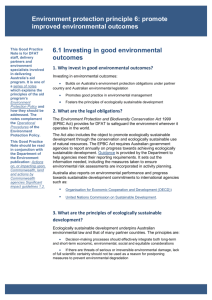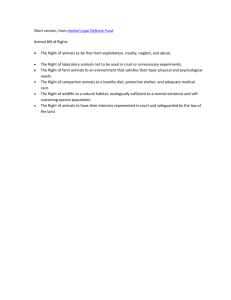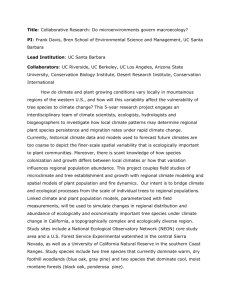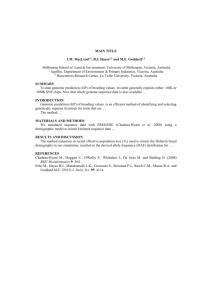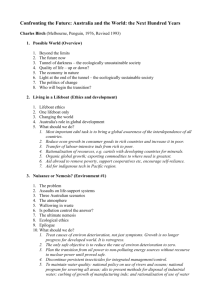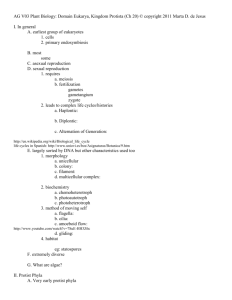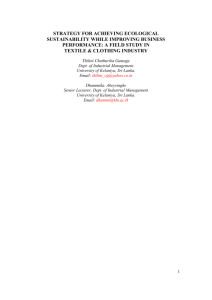Whaling – Global Approaches to sustainable development
advertisement
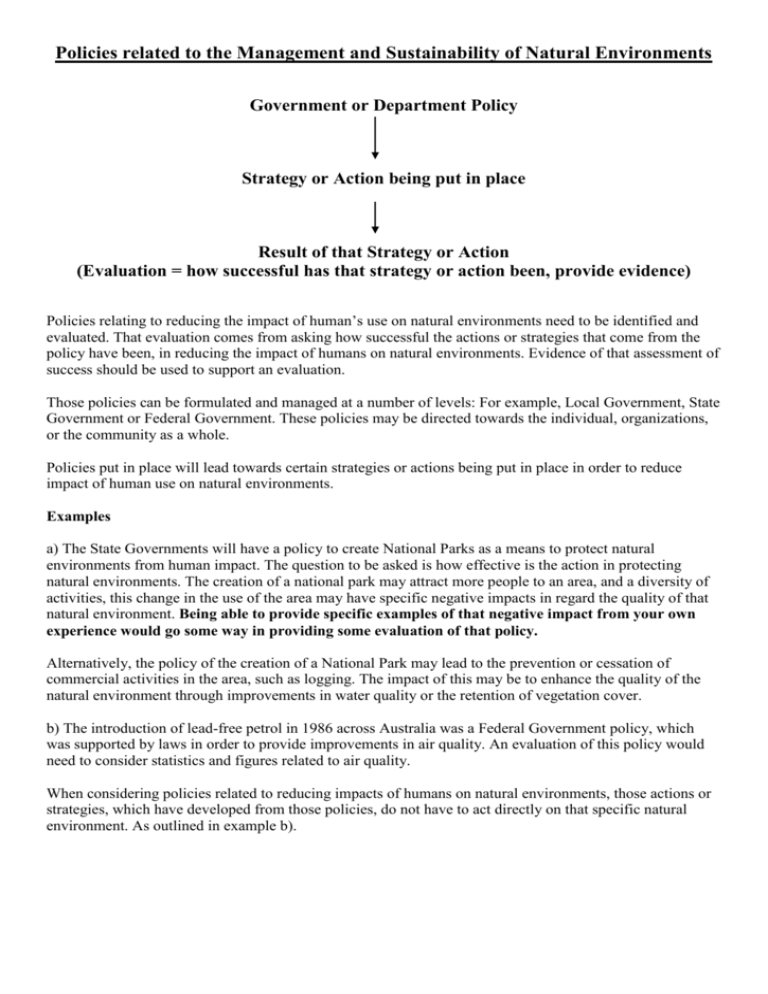
Policies related to the Management and Sustainability of Natural Environments Government or Department Policy Strategy or Action being put in place Result of that Strategy or Action (Evaluation = how successful has that strategy or action been, provide evidence) Policies relating to reducing the impact of human’s use on natural environments need to be identified and evaluated. That evaluation comes from asking how successful the actions or strategies that come from the policy have been, in reducing the impact of humans on natural environments. Evidence of that assessment of success should be used to support an evaluation. Those policies can be formulated and managed at a number of levels: For example, Local Government, State Government or Federal Government. These policies may be directed towards the individual, organizations, or the community as a whole. Policies put in place will lead towards certain strategies or actions being put in place in order to reduce impact of human use on natural environments. Examples a) The State Governments will have a policy to create National Parks as a means to protect natural environments from human impact. The question to be asked is how effective is the action in protecting natural environments. The creation of a national park may attract more people to an area, and a diversity of activities, this change in the use of the area may have specific negative impacts in regard the quality of that natural environment. Being able to provide specific examples of that negative impact from your own experience would go some way in providing some evaluation of that policy. Alternatively, the policy of the creation of a National Park may lead to the prevention or cessation of commercial activities in the area, such as logging. The impact of this may be to enhance the quality of the natural environment through improvements in water quality or the retention of vegetation cover. b) The introduction of lead-free petrol in 1986 across Australia was a Federal Government policy, which was supported by laws in order to provide improvements in air quality. An evaluation of this policy would need to consider statistics and figures related to air quality. When considering policies related to reducing impacts of humans on natural environments, those actions or strategies, which have developed from those policies, do not have to act directly on that specific natural environment. As outlined in example b). Sustainable Development Within society a broad and diverse array of policies, management approaches and strategies have been put in place in order to work towards ecologically sustainable development of natural environments. Most of these policies have been put in place by the different levels of Government in response to public pressure and expectations related to natural environments. It is important to have knowledge of the policies and management approaches that exist and to understand some of the relationships between these different approaches. Whaling – Global Approaches to sustainable development International agreements have resulted in the banning of whaling for commercial exploitation around the world. This is an example of policy and management approaches, which has been undertaken on a global level in order to maintain an ecologically sustainable approach to this aspect of the natural environment. The Koyoto agreement on greenhouse gases has also been an example of how the global community has attempted to establish policies and strategies in order to achieve ecologically sustainable development. Within Australia Policies and Strategies can be undertaken within an integrated fashion from Federal, State and Local government levels or the different levels of government may work independently to put policies and management approaches in place. At a Federal level the Australian Government has adopted the following policies. National Strategy for Ecologically Sustainable Development National Strategy for the Conservation of Australia's Biological Diversity These policies are supported by a range of laws (legislation which attempts to provide guidelines and support for sustainable development) Environment Protection and Biodiversity Conservation Act 1999 Environment Protection (Sea Dumping) Act 1981 National Environment Protection Council Act 1994 National Environment Protection Measures (Implementation) Act 1998 Wet Tropics of Queensland World Heritage Area Conservation Act 1994 Wildlife Protection (Regulation of Exports and Imports) Act 1982 The Federal Government also supplies funding for projects, which support ecologically sustainable development. Funding for research into renewable energy. Establishment for wind farms Land care projects Protection of Great Barrier Reef Environment Australia Website for more info at the Federal level related to ecologically sustainable development. www.ea.gov.au At a state level policies and strategies can have a more direct impact on natural environments as state governments have more controls over land? In Victoria the following policies support ecological sustainable development of natural environments. The establishment of Marine National Parks and new National Parks in Central Victoria. Victoria’s Biodiversity Strategy The establishment of wind farms in Gippsland and Western Victoria State Government laws, which support ecological sustainable development of natural environments or protection of natural environments, include: The Flora and Fauna Guarantee Act The National Parks Act 1975, Forest Act 1958, Fisheries Act 1995, Wildlife Act 1975 Environmental Protection Act 1970 The State Government also supplies funding for projects, which support ecologically sustainable development. For example: Research into Sustainable Dolphin Tourism in Port Phillip Bay These websites can provide further information www.nre.vic.gov.au/plntanml/biodiversity www.nre.vic.gov.au/web/root/domino/cm_da/nrenrt.nsf/frameset/NRE+Recreation+and+Tourism?OpenDoc ument Your own local council will also have laws, policies and strategies, which aim to promote sustainability and sustainable development of natural environments.
